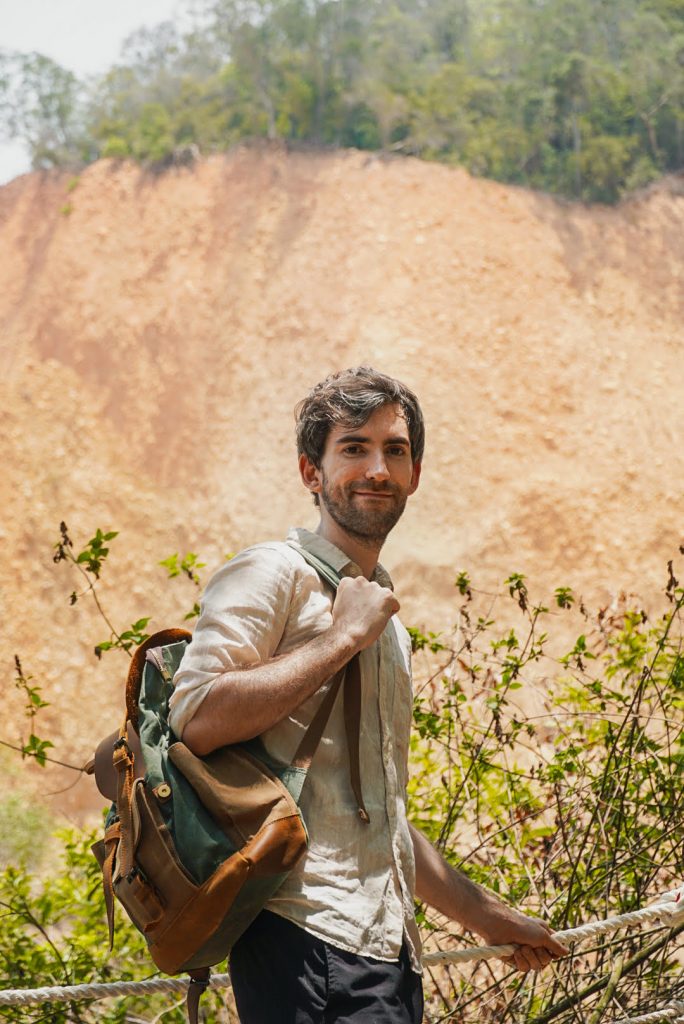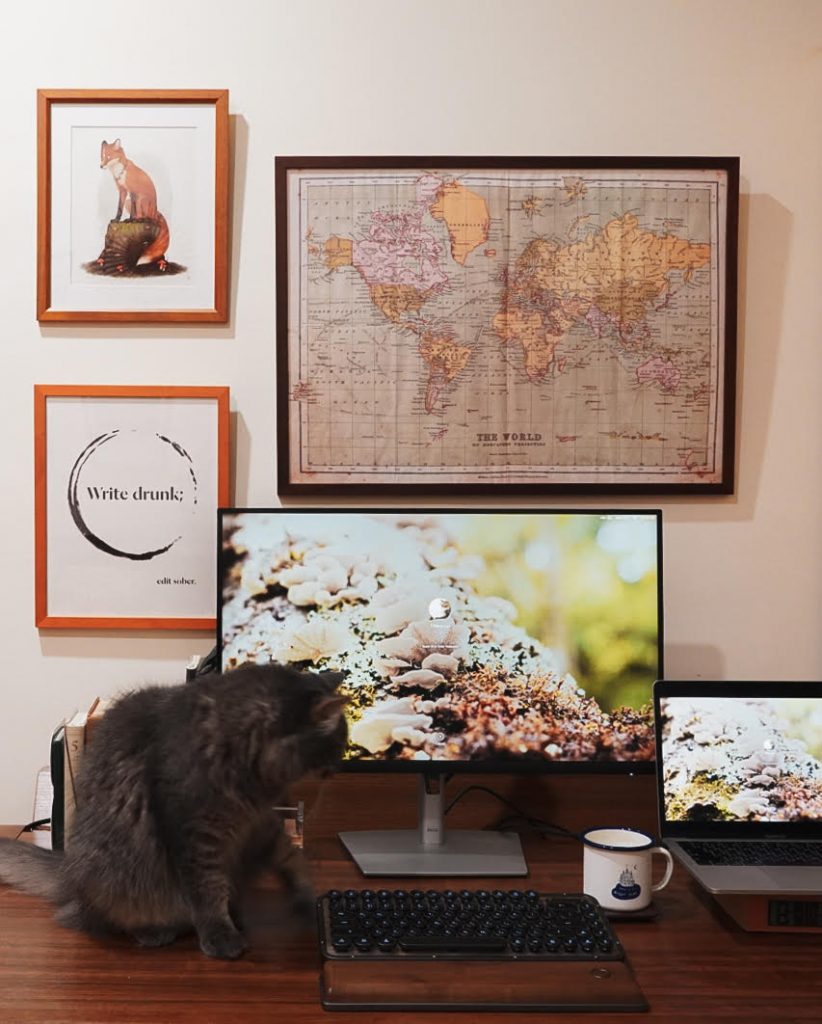1. Hey, can you please introduce yourself?
Hi everyone. I’m Robert Jellison, the lead insurance editor for RentSwift, an apartment-hunting website that also features a lot of articles about renters insurance. We’re in the process of launching FinanceJar, a site that will cover other aspects of personal finance, like credit repair and personal loans. Our goal is to provide a complete and accurate guide to the money management skills that we think the other major finance sites have neglected so far.
I live in Taipei, Taiwan, with my partner and my cat, who at this moment is trying to squirm his way onto my keyboard. That’s a lie — he’s actually ignoring me because he thinks I didn’t feed him enough this morning — but he does it often enough that it easily could have been true.
2. What motivated you to choose remote working?
I started down the path towards remote working about four years ago, when I moved to Taiwan. I’m an English-language writer and editor, and I live in a country where the majority language is Mandarin Chinese, which, believe it or not, is not English. There are a lot of expats in my situation — people who’ve settled down here because it’s a beautiful country with a low cost of living, and found jobs working remotely for US-based companies or established themselves as freelancers.
My current (fully remote) job kind of fell into my lap. I was job hunting and happened to grab coffee with someone I used to work with, and they told me they were launching a new website and needed an editor. One of the first things they said was, “We don’t actually have an office right now, so it’s a remote position. Is that OK with you?” I’ve never been the biggest fan of commuting, sitting all day in an office, or being presentable before 10 am, so needless to say, it was.
3. What were your initial months like? Did it live up to your expectations?
Oh, my first few months sucked. The problem was, I have this squat little device in my kitchen called a “coffee maker.” I don’t know whether your readers have heard of these things, but the way they work is, you go up and push a button, and about a minute later you receive a cup of bitter brown liquid. Drinking it wakes you up, but if you drink too much you get terribly anxious and you end up shaking at your desk, periodically checking the weather forecast for meteors.
My old office also had a coffee maker, but I couldn’t abuse it too badly, because usually after my fourth or fifth cup somebody would say “damn, Rob” and I’d know it was time to stop for the day. When I started working from home, I didn’t have anyone to shame me, and consequently by 4 pm I’d be on cup number nine, having a quiet internal breakdown.

So obviously I’m joking, but that does underscore a real point, which is that I pretty quickly realized that without a certain amount of social pressure, I’ll stop taking care of myself. When I worked in an office, I imagined that once I had total control over my workspace, I’d establish all these healthy routines, I’d get a treadmill desk and make a fresh salad every day for lunch, and obviously at first I did absolutely none of that. It took me a while to develop the discipline to take care of myself when left completely to my own devices. Also, I switched to drinking tea.
4. How did you find remote working roles?
I started by landing a non-remote job in a remote-friendly field and staying in it long enough to prove that I was trustworthy. Like I said, I landed my next (remote) position through the contacts I made there.
I don’t know whether this advice will be useful to your readers — it depends on how many of them are expats — but when you live abroad, sometimes all you have to do to get a remote job is to tell your manager that you’re moving but you want to keep working for them on a remote basis. If they’ve worked with a lot of expats, you might not be the first one to make that request, and if you have a good relationship they may be open to it.

To do that, you usually do have to spend a year or two proving yourself in a traditional office job first. You’ll also have a much better shot if you work for a forward-thinking company, like a software startup. Most traditional companies will shut you down pretty hard.
5. What have been the best, good and worst aspects of remote working for you?
The best: Getting to sprawl anywhere in my apartment that I want.
I’m in the camp that says that sitting for prolonged periods is bad for you. I read an article once (written by a scientist or possibly several scientists) that said it compresses your spine or something. Maybe it weakens your core? Look, I don’t really know, the point is, it’s bad for you and you shouldn’t do it.
Obviously some offices feature couches and standing desks, but I still like having the freedom to flop down anywhere I like without drawing weird looks.
The good: Stealing my girlfriend’s self-care products while she’s at work. (Her job isn’t remote, so I get to do this every day.)
I don’t even know what most of them are. She recently bought this little jar of goop that has flecks of gold in it. I think it exfoliates your skin. Anyway, I’ll dip into it every few days, just a little bit each time so she doesn’t notice. Don’t link her to this interview or she’ll find out.
The worst: Video calls. Is there anyone out there who actually likes them? That’s rhetorical, don’t answer that. A better question: is there anyone who actually looks at the other people on the call instead of laser-focusing on the little window with their own face?

Video calls are sometimes necessary, but between connectivity issues and that inevitable split-second lag that always causes everyone to start talking at once, they take about twice as long as they should. And that’s without getting into the two bandits that every remote team has: guy-who-always-starts-talking-even-though-his-microphone-is-off, and his twin brother, guy-who-leaves-his-mic-on-even-when-he-really-shouldn’t.
6. What tools do you swear by while working remotely?
I’m pretty basic — I use Teams and Zoom to chat with people, Google Sheets and Docs to actually work, and Spotify and a good pair of noise-canceling headphones to stay sane.
It’s the headphones that are really crucial. As I write this, my downstairs neighbor is building something. I suspect it’s a bed of nails. I’m not sure why he’s building such a thing, but it’s the only explanation for why he’s been hammering constantly for the past five hours. My headphones are the only reason I’ve gotten anything done today.
7. Your most exciting/ hilarious experience since you started working remotely.
I used to live directly across from a dumpling restaurant. I really can’t tell you how many times I’d be talking to someone on Zoom — pacing around and gesticulating wildly, as one tends to do on work calls — and I’d look up and see someone had been eating dumplings and watching me the entire time. I provided free entertainment to that dumpling restaurant for a year and a half.
8. What is your golden advice to a new remote worker?
When you’re remote, you have to learn how to manage your time, since you won’t have a supervisor two cubicles over to manage it for you. That means being disciplined with yourself and not slacking off, but it also means learning to pace yourself so that you don’t burn out.
My advice — and this really goes for any job, not just remote work — is to figure out how much “deep work” you have in you per day. That’s a really important number because you can’t measure your productivity without it.

The standard workday is eight hours long, but that dates back to when most people were engaged in repetitive manual labor, screwing in doodads on assembly lines and so on. It doesn’t have much to do with modern creative work like writing or coding.
I think a lot of people hit the point of diminishing returns after five to six hours of mentally draining deep work, which is fine. But if you’re in that boat, you have to figure out something worthwhile to do while you’re recharging. For me, that usually means research, since I have to spend a lot of time reading insurance policies from different companies (yeah, I know). For other people, that might mean tinkering with a fun but work-related side project, or unwinding to a podcast while doing necessary but mindless admin stuff.
9. How do you see your career shaping up and your goals?
Okay, this is the part where I plug our sites a little bit. We’re in the process of launching a network of blogs that explain aspects of personal finance that we think haven’t been covered very well yet — in-depth reviews of renters insurance companies, guides on how to repair your credit that aren’t trying to sell you anything, and so on. We weren’t really satisfied with how all the big-name sites handled those topics, so we decided to do it ourselves.
My goal is always to publish more articles, publish better articles, and do my best to make sure we have the most interesting, most accurate content on whatever subject we happen to be targeting at that moment. We’re actually in the process of writing and publishing a book about credit repair, which has been a lot of fun to write and which we’re pretty excited about.
10. How do you expect remote working to evolve in the future?
The pandemic has taught us that a lot of jobs can be done remotely at full efficiency, but it’s also shown us that a lot of managers are absolutely terrified of remote work. You’ve probably heard about some workplaces doing ridiculous things like forcing their staff to leave their webcams on all day so they can keep them under constant surveillance.
I think the cultural fallout from the pandemic will be complex. Remote working went mainstream in a big way last year, but there was also a backlash, and I expect that to continue. Companies that successfully handled the pandemic will continue to explore remote work, and I’m sure some people will demand to remain fully remote from now on, but I think a lot of companies (and managers) will become even more opposed to it than they were before.
Ultimately I do expect Team Remote to win and remote work to become widespread, but I think it’ll be a good ten to fifteen years before that happens. Managing a remote team requires a very specific set of skills, and it’ll take a while for enough institutions to realize that doing so is a worthwhile investment instead of a regrettable necessity.
11. Where can we follow you on?
You can read my articles on RentSwift or our new website FinanceJar. I keep a pretty low online profile otherwise, so I don’t have a Twitter that you can follow, but anybody who wants to get in touch is welcome to message me on my LinkedIn.